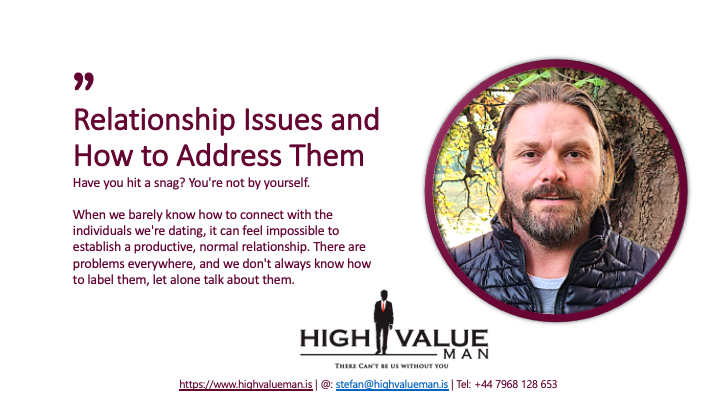Have you hit a snag? You're not by yourself.
When we barely know how to connect with the individuals we're dating, it can feel impossible to establish a productive, normal relationship. There are problems everywhere, and we don't always know how to label them, let alone talk about them.
Men have their own set of relationship challenges, many of which stem from how men are raised. I can confirm this from my own experience and upbringing, my life has been influenced by society's expectations and the people I looked up to.
While it is appropriate and expected for women to express emotion and talk about their problems, males do not. "From a young age, men are socialised not to talk about their issues or struggles. As a result, men are not expected to display or express emotions." This can put a lot of strain on love relationships. After all, good relationships are built on the foundations of emotions, communication, and a sense of safety in expressing oneself.
With this knowledge in mind, here are four of the most typical relationship problems males face that I have had to work on and overcome.
1. Rejection anxiety
Men are often afraid of rejection. As a result, men are more likely than women to ask someone out on a date or for sex, and there's always the risk that the women won't be interested. In my dating days, it was the hardest thing I would ever have to do. I still cringe of the thought...
Because rejection is associated with being "less manly" or desirable, I hesitated to take the risk in the first place. And for some men, if they are rejected, they may have sentiments of bitterness and overall hatred against the individual who rejected them. These are unhealthy emotions, and men frequently lack the tools to deal with them effectively. In addition, rejection and a lack of communication skills in a love relationship can lead to isolation, misunderstandings, and even breakups. So here I have spent time on myself to get over this association and put in context that it may not have anything to do with me if someone says no.
So it is crucial to don't bury your emotions and shove them beneath the surface. Also, don't lash out at your partner. Instead, say something like, "It hurt my feelings when you wouldn't come with me to my friend's happy hour," or "I felt vulnerable when you wouldn't let me hold your hand." That's how you get a constructive and healthy discussion started.
According to clinical psychotherapists, when men are refused sex, they may experience particularly unpleasant sentiments. If this happens to you, it's critical to talk to your partner about sexual concerns, even if it's complicated. Experts have long claimed that couples who discuss sex freely are happier in general.
2. Depression, anxiety, and other mental health concerns are often hidden from partners.
"Men generally hide their difficulties and don't disclose them to anyone. As a result, they cram and stack their problems, which frequently leads to outbursts or self-destructive conduct." According to clinical psychotherapists, this can also lead to feelings of despair and worry since they don't want to be perceived as weak. This was one of the hardest things for me to get grips with. I would usually bury my emotions and get on with things.
Between not knowing how to deal with mental illness and the persisting societal stigma surrounding these issues—have you ever been urged to "take it like a man"?—it's little wonder people are struggling. Unfortunately, untreated sadness and anxiety affect far too many guys these days, and we don't know where to turn to.
Clinical psychotherapists advise that "guys need to speak up to their partner." "Your partner is ready to listen to you, and they want you to speak up." So don't be concerned about appearing frail. Instead, express your emotions and sentiments."
Women, in particular, bond through conversation. You'll probably find yourself in a healthier, happier relationship if you stop worrying so much about looking weak and accept that a person who loves you would never think you were weak for feeling normal human emotions.
3. There's a lot of pressure on you to be the breadwinner.
Even though our culture is more equitable than ever before, some men still feel obligated to provide for their families and are uncomfortable with women being the primary breadwinner. They may believe, incorrectly, that their value is directly proportional to their financial achievement. Or as I felt that I had to be the provider and protector of the family, or else I was not a man.
When a man loses his job, earns less than his spouse, or does not earn enough to provide for his family, he may experience emotions of sadness, inadequacy, and worry. This can lead to bitterness and strain in a relationship.
Some women may also be uncomfortable about earning more than their male counterparts. Indeed, according to the Times, a recent Census Bureau analysis indicated that a rising percentage of women are earning more than their husbands. Still, no one wants to talk about it.
Obviously, the norm of "men as financial guardians" is a stupid, outmoded idea that we should abandon, but progress is sluggish. We'll see this pressure continue until we as a culture recognise that both men and women should be financially responsible and have equal weight in all parts of a relationship.
4. Sex-related performance anxiety
According to clinical psychotherapists, men frequently suffer high levels of performance anxiety before and during sex. Through the years, I had my own body and performance issues that shaped my relationship with my partners, contributing to my performance anxiety and not being present in sex-related activities.
The societal script plainly states that a guy should be ready for sex, rock hard, and ready to go at any time of day...but this is just not feasible, and this was hard for me to understand and that it was ok to not to have mind-blowing sex all the time. It's ok that things don't always go as planned when you have sex. For instance, when a guy feels compelled to obtain or maintain an erection, he is significantly less likely to succeed. It's a sexual Catch-22 situation.
Nearly 20% of men with erectile dysfunction are coping with psychological concerns rather than physical ones. So instead of quickly reaching for Viagra, men should address the emotional problems that might lead to ED.
Instead of internalising your feelings of guilt and shame, which adds to your nervousness about over-performing in bed, consider discussing them with your partner. You can also consider talking to a therapist.
Always remember sex is about having fun with your partner, and it's ok to have a laugh when things don't go as planned... 😉
The Ability to Change
Do you want further information on working through these challenges? If so, please ping me!


